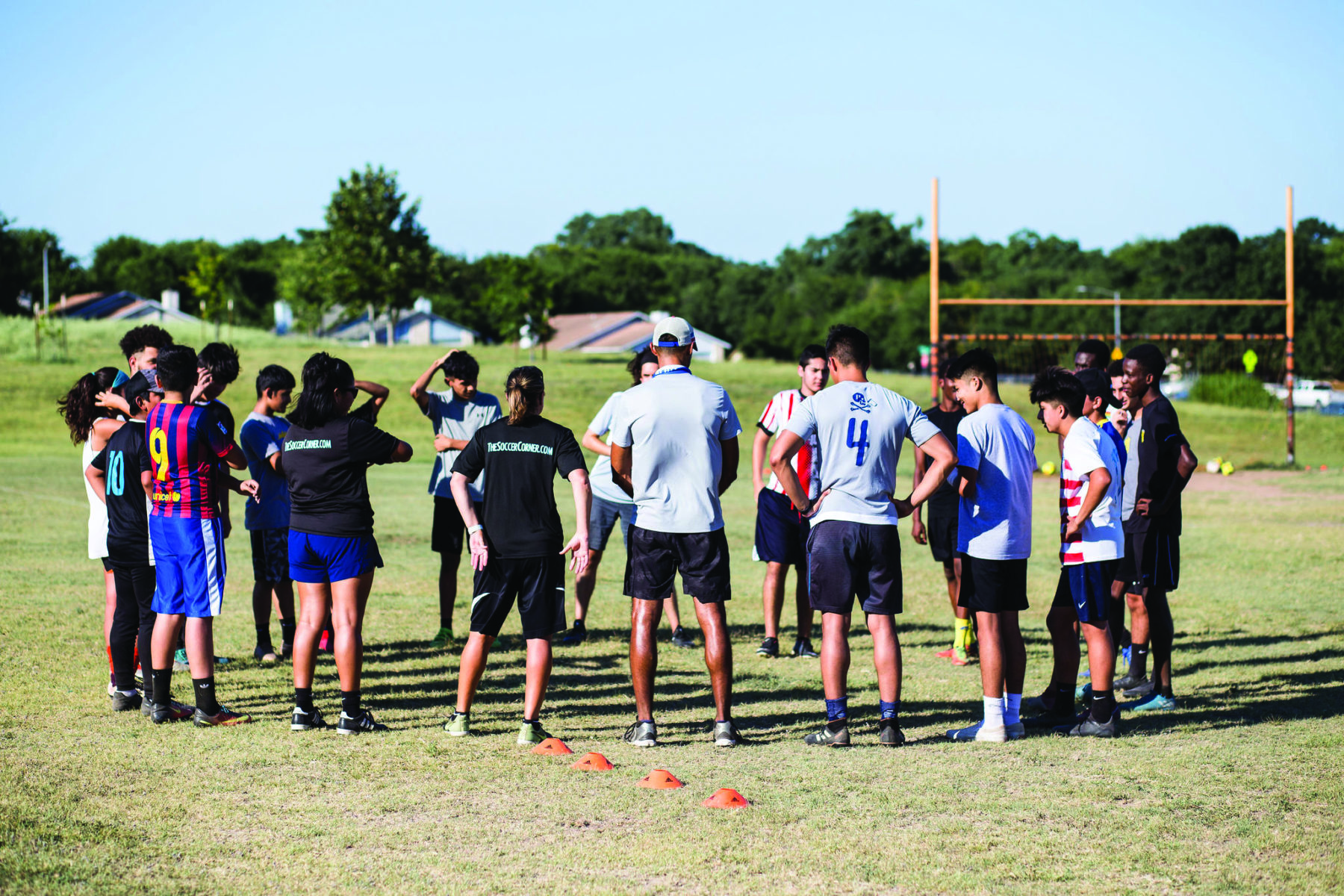The Power of Sports For Youth

Two Austin nonprofits work to bring equal access to sports to under-resourced children.
When the bell releases kids from class at the end of the day, students race out of the classroom. With backpacks flying behind them and a snack in-hand, they are excited to practice sports, see their coaches and join in fellowship with their peers.
“I still remember we had one kid named Andy, and he had never thrown a football,” says Hana Arriaga, CEO of SCORE Athletics. “Something like that sticks with you. After learning to throw the football, he was determined to master it. Just the idea that we have the ability to instantly enhance someone’s life is really exciting.”
The 2019 State of Texas Children Report found one in five Texas children live in poverty. In many under-resourced public schools, they lack the ability to fund sports programs where so many of these kids receive education.
Programs like Upper Ninety and SCORE Athletics are two organizations among many which seek to provide sports and mentorship programs to low-income schools across Travis county.
“I think we are just trying to create a space where everybody is welcome,” says Kaitlyn Swarts, vice president of community engagement for Austin FC and founder of Upper Ninety. “We really want to work with students who would not have opportunities to play and learn through sports programs and work with them to become better soccer players, students, friends and brothers and sisters.”
According to the National Youth Sports Strategy, sports can help facilitate the development of useful life skills including goal-setting, emotional control, self-esteem and work ethic. Research also shows that organized sport participation can reduce youth violence, dropout rates and lead to fewer disciplinary problems.
Using soccer as an educational tool, Upper Ninety was founded in 2017 with the purpose of helping low-income students in Austin thrive in high school and beyond. Using proven research, the program combines soccer training and games with socio-emotional learning, restorative justice and mindfulness.
“Our goal is to help students develop skills they need to go to college, get their first job and get through the tough times we know everyone faces,” Swarts says. “It is really kind of just a community of support that they build to help them in whatever situation.”
Recently, Upper Ninety announced its alignment with Austin FC and their nonprofit 4ATX. Through Upper Ninety, Austin FC hopes to focus on bringing soccer and educational opportunities to low-income students in Austin by bearing more resources to help amplify the impact of Upper Ninety and soccer in the community.
President of Austin FC, Andy Loughnane, says one of the byproducts of being on a team is teamwork and creating opportunities to become more confident and instill leadership skills that might not otherwise develop without being a part of the team.
“It starts on the field,” Loughnane says. “I’d like to think the ability to look to one of your other 10 teammates on the field and point to them and help provide guidance is the starting point for becoming somebody who is in a position to share ideas and teach and allow somebody to show them a different way to reach a goal.”
While Austin FC is still a year out from playing, Swarts says the crest symbolizes bringing the north, east, south and west together through soccer.
Similar to Upper Ninety is SCORE Athletics. This nonprofit was founded by a group of UT students in the fall of 2018. With programs at six different elementary schools, SCORE Athletics seeks to give kids, who specifically do not have access to organized sports, the foundational component of what being on a team is like through soccer and flag football.
Arriaga, CEO of SCORE, says the organization hopes students will gain experience which will hopefully encourage them to pursue teamwork on their own.
“The evidence is clear that team-based interactions — having someone else to bounce off your ideas — is growing your own your growth mindset and making you think in broader terms,” Arriaga says. “And so, I think these kids are learning not only how to communicate with adults who want to help them, but communicate with each other. And those skills ultimately will foster good workplace skills one day when they’re older.”
Similar to Upper Ninety, SCORE developed a curriculum which allows for a mixture of practice and relationship-building between students and coaches.
This curriculum is designed to help students find some sense of improvement and satisfaction in a skill they are working to develop, Arriaga says.
“You can really see by the end of the semester their progression when they can do it on their own,” Arriaga says. “Usually with football, we start with a coach being the quarterback, and by the end of the season, we have progressed into all kids.
While SCORE and Upper Ninety are designed to help children learn, develop and build relationships, Swarts and Arriaga both agree the program is just as encouraging for the volunteers.
“When you get to the school and realize these kids are waiting at the door, eager to see you, I think that is something you don’t realize is so meaningful until you are a part of the organization,” Arriaga says. “These kids, they don’t forget their coaches, and I think that’s so special — and their coaches don’t forget them either.”






